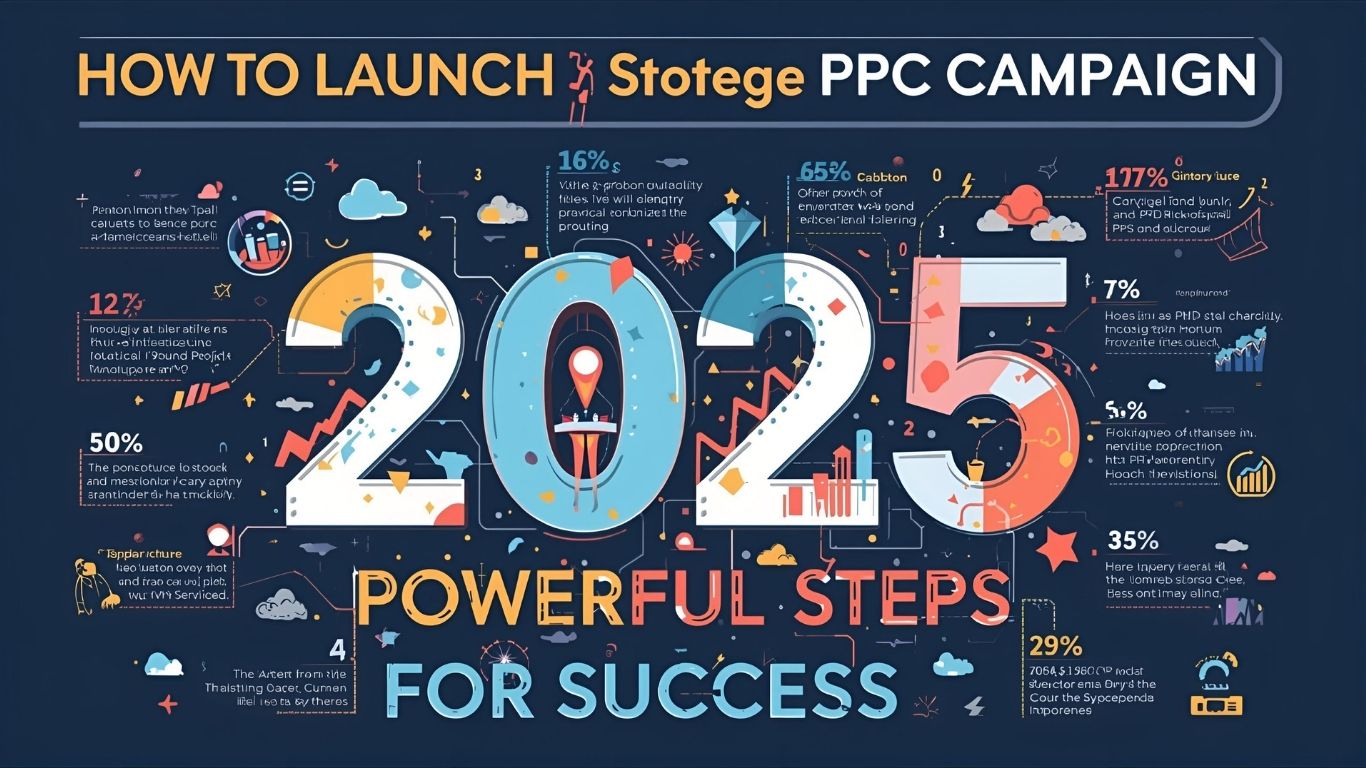How to Launch a PPC Campaign in 2025: 7 Simple Steps to Drive Success #PPC #Marketing #GoogleAds
How to Launch a PPC Campaign in 2025: 7 Powerful Steps to Success
Launching a PPC campaign in 2025 is like preparing for a grand adventure. Much like setting off into the unknown, there’s excitement, challenge, and the promise of reward. But the landscape has changed, and so must the approach. The days when you could simply throw some money at Google Ads and hope for the best are long gone. Today’s digital marketing world demands finesse, planning, and strategic thinking. If you’re wondering how to launch a PPC campaign in this dynamic environment, you’re in the right place. Let’s walk through the seven essential steps that will lead you to success.
Step 1: Setting Clear, Measurable Goals for Your PPC Campaign
Before you take the plunge, think of your PPC campaign as a road trip. Would you leave your house without knowing where you’re going? Of course not. Similarly, without clear goals, your campaign lacks direction.
To launch a PPC campaign successfully, the first thing you need is a concrete objective. Are you aiming to increase sales, grow your email list, or raise brand awareness? Your goals should be specific, measurable, achievable, relevant, and time-bound (SMART). This clarity will act as your compass throughout the campaign.
- Sales Growth: If your goal is to drive sales, you’ll focus on conversions.
- Lead Generation: For lead generation, focus on capturing valuable contacts.
- Brand Awareness: Here, your goal is to reach as many potential customers as possible, even if they don’t immediately click.
By setting clear goals, you ensure that every dollar spent on your PPC campaign is working toward achieving these objectives.
Step 2: Choosing the Right Keywords for Effective Targeting
Now that you know your destination, it’s time to figure out how to get there. Think of keywords as the highways that will take your potential customers to your doorstep. When you’re trying to figure out how to launch a PPC campaign, your next step is keyword research. It’s the backbone of any successful PPC campaign.
You need to choose keywords that not only align with your business but also have a healthy balance between search volume and competition. To do this, you can use Google’s Keyword Planner, SEMrush, or Ahrefs. Don’t just settle for broad terms; long-tail keywords are essential. These are more specific and often have a higher conversion rate.
For example, instead of targeting “buy shoes,” a more specific keyword like “buy eco-friendly shoes online” will attract the right audience—people genuinely interested in your product.
- Broad Match Keywords: These are helpful for discovering trends but can be costly if not targeted correctly.
- Exact Match Keywords: These are highly specific and less likely to waste your budget.
- Long-Tail Keywords: Perfect for targeting niche audiences and reducing competition.
Step 3: Crafting Compelling Ad Copy that Converts
Ad copy is where the magic happens. If how to launch a PPC campaign feels like a road trip, then ad copy is the map that guides people along. Think of it as the invitation to step into your store.
To create ads that stand out, you need to be clear, concise, and compelling. Use your ad copy to highlight what makes your offer unique. Are you offering a discount? Maybe free shipping? Or do you have the best quality products? Whatever it is, make sure it’s clear in the ad.
- Powerful Call-to-Action (CTA): Always include a strong CTA. Phrases like “Get Started Today,” “Shop Now,” or “Claim Your Discount” urge users to take action.
- Incorporate Benefits: Focus on what the user gains from clicking your ad rather than just listing features.
- Ad Extensions: Use callout extensions, site link extensions, or location extensions to provide extra information to users.
For instance, if you’re promoting an online store, a compelling PPC ad might say:
“Buy Trendy Shoes for Summer | Free Shipping | 20% Off Today Only”
This ad is clear, enticing, and provides multiple benefits, making it more likely to drive clicks.
Step 4: Setting a Realistic Budget and Bidding Strategy
Like every great adventure, your PPC journey requires a budget. Without setting limits, your costs can easily spiral out of control. When you’re trying to figure out how to launch a PPC campaign, one of the most crucial elements is budgeting.
Start by setting a daily or monthly budget based on how much you’re willing to spend on ads. From there, you’ll need to decide on a bidding strategy:
- Manual Bidding: You set your bids manually for each click or conversion.
- Automated Bidding: Google adjusts your bids to get the most conversions within your budget.
It’s crucial to keep track of your budget and adjust as needed. If one ad group is performing better, you might want to allocate more of your budget toward it.
- Cost Per Click (CPC): This is the most common bidding strategy, where you pay each time someone clicks your ad.
- Cost Per Acquisition (CPA): Here, you pay for the actual conversion, not just the click.
- Return on Ad Spend (ROAS): This method focuses on maximizing the return for every dollar spent.
Step 5: Choosing the Right Targeting Options for Your Audience
Your PPC campaign is only as effective as your audience targeting. How to launch a PPC campaign without effective targeting is like sending an invitation to a party and not specifying who’s invited.
There are multiple targeting options available to you, depending on your platform:
- Geographic Targeting: Use location targeting to show your ads only to people in specific cities, regions, or countries.
- Device Targeting: You can focus on desktop, mobile, or tablet users.
- Demographic Targeting: This allows you to tailor ads to specific age groups, genders, income levels, etc.
For instance, if you’re selling fitness equipment, you might want to target young professionals who are interested in health and fitness and live in urban areas.
Step 6: Monitoring Campaign Performance and Analyzing Results
The journey doesn’t end once your PPC campaign is live. You need to continually monitor your campaign’s performance and analyze the data to make improvements.
Use tools like Google Analytics or the Google Ads dashboard to track metrics like:
- Click-Through Rate (CTR): The percentage of people who clicked on your ad versus how many saw it.
- Conversion Rate: How many people took the desired action (buying, signing up, etc.) after clicking your ad.
- Cost Per Acquisition (CPA): The amount you spent on acquiring each customer.
This data will help you understand what’s working and what isn’t. Don’t be afraid to adjust your keywords, bids, or ad copy based on your findings.
Step 7: Scaling Your Campaign for Maximum Impact
Once your campaign is running smoothly, it’s time to scale. Scaling is not just about increasing your budget—it’s about improving efficiency and expanding your reach.
- Expand Your Keyword List: As you gather more data, you can find new keywords to target.
- Test New Ads: Continuously A/B test your ads to see what resonates most with your audience.
- Increase Budget for High-Performing Campaigns: As you identify top performers, allocate more budget to them to maximize results.
Scaling is where the real growth happens, and it requires constant attention to ensure that the expansion is both sustainable and profitable.
Conclusion: Embracing the Future of PPC
Now that you’ve learned how to launch a PPC campaign, you’re equipped to venture into the world of digital advertising with confidence. The PPC landscape in 2025 is constantly evolving, and by following these seven steps, you’re positioning yourself to thrive.
Remember, every successful PPC campaign starts with a well-planned strategy, a keen eye for targeting, and a commitment to constant optimization. As you grow your campaign, keep an eye on trends, be willing to adapt, and, most importantly, stay engaged with your audience. PPC is a journey—one that can be both rewarding and transformative for your business.
Bullet-Point Summary:
- PPC in 2025: Understanding the evolution of PPC and why it’s crucial for businesses today.
- Set Clear Goals: Defining specific, measurable campaign objectives is the first step in PPC success.
- Keyword Research: Selecting the right keywords with tools like Google Keyword Planner is essential for targeting the right audience.
- Maximize Reach with Google Ads: Learn how to leverage Google Ads’ audience targeting features for optimal reach and engagement.
- Budgeting Smartly: Use smart bidding strategies and set clear budgets to make the most of your PPC campaign.
- Effective Targeting: Focus on demographic, geographic, and behavioral targeting to ensure your ads are seen by the right people.
- Crafting Compelling Ads: Writing engaging ad copy and using visuals and strong CTAs to convert visitors.
- Optimizing Campaign Performance: A/B test your ads and analyze metrics like CTR and conversion rate for optimization.
- Troubleshoot Low-Performance Ads: Identify issues with ad performance, such as targeting or copy, and make adjustments.
- Advanced Strategies: Integrate AI and cross-platform campaigns for a competitive edge in PPC.
- Monitoring and Adjusting for Trends: Regularly check campaign performance and adjust for seasonal trends and market shifts.
Unique FAQs with Answers
1. What is PPC, and how does it work?
PPC (Pay-Per-Click) is a digital advertising model where advertisers pay a fee each time their ad is clicked. It works by bidding on keywords relevant to their products or services. When a user searches for a keyword, the advertiser’s ad appears on the search engine or website. If the user clicks on the ad, the advertiser pays the bid amount.
2. How do I set a budget for my PPC campaign?
To set a budget for your PPC campaign, determine how much you’re willing to spend each day or month. Break down your costs based on your goals, whether it’s clicks, conversions, or impressions. Google Ads and other platforms offer automated bidding strategies that help you manage your budget effectively.
3. What are long-tail keywords, and why are they important in PPC?
Long-tail keywords are longer, more specific keyword phrases. They’re crucial for PPC because they often have lower competition, cost less, and convert better by targeting users with clearer intent. For example, “best PPC campaign for small businesses” is a long-tail keyword compared to just “PPC.”
4. How can I track the success of my PPC campaign?
You can track success through various metrics, such as CTR (Click-Through Rate), CPC (Cost-Per-Click), ROI (Return on Investment), and conversion rates. These help you understand how well your ads are performing and whether you’re meeting your campaign goals.
5. Should I use automated bidding in my PPC campaign?
Automated bidding can save time and optimize your bids for better performance. Google Ads uses machine learning to automatically adjust bids based on your campaign goals. However, you should monitor results regularly and make adjustments as needed to ensure you’re not overspending.
6. What is the role of A/B testing in PPC?
A/B testing involves creating two versions of an ad to compare which one performs better. By testing variations in headlines, ad copy, or CTAs, you can optimize your campaign and improve its performance, leading to more clicks and conversions.
7. How do I choose the right keywords for my PPC campaign?
Use keyword research tools like Google Keyword Planner to find relevant keywords with high search volume and low competition. Ensure your selected keywords align with your product or service, and consider using long-tail keywords for better targeting.
8. What is the difference between CPC and CPM in PPC?
CPC (Cost-Per-Click) is the amount you pay when someone clicks your ad, while CPM (Cost-Per-Thousand Impressions) is the amount you pay for every thousand times your ad is shown, regardless of clicks. CPC is typically used for conversion-focused campaigns, while CPM is more suitable for brand awareness.
9. Can I run PPC campaigns on social media platforms?
Yes, social media platforms like Facebook, Instagram, and LinkedIn offer PPC advertising options. Social media ads allow you to target specific audiences based on demographics, interests, and behaviors, complementing Google Ads campaigns for broader reach.
10. How do I improve my ad’s quality score in Google Ads?
A higher Quality Score in Google Ads can lead to lower costs and better ad placement. To improve your score, focus on creating relevant ads with high-quality landing pages, targeting relevant keywords, and improving your click-through rate.
11. What is remarketing in PPC?
Remarketing allows you to target users who have previously visited your website but didn’t convert. You can show them customized ads across Google or other platforms, reminding them of your product or service and encouraging them to complete the action.
12. What are the most common mistakes in PPC campaigns?
Common mistakes include choosing irrelevant keywords, setting too low a bid, neglecting mobile optimization, not tracking performance metrics, and not testing different ad creatives. Regular optimization and performance analysis help you avoid these issues.
13. How do I target specific geographic locations in my PPC campaign?
Most PPC platforms, including Google Ads, allow you to geo-target your ads. You can select specific regions, cities, or countries to show your ads, ensuring you’re reaching the audience most likely to convert based on location.
14. What’s the difference between a good and bad PPC ad?
A good PPC ad is relevant, clear, and compelling, with a strong call-to-action (CTA). It matches user intent and offers a solution. A bad ad, on the other hand, is vague, irrelevant, or lacks urgency, resulting in low engagement and conversions.
15. How do I ensure my PPC ads are mobile-friendly?
Ensure your landing pages are responsive, meaning they adapt to mobile screens. Additionally, use mobile-specific ad formats such as call extensions or location-based ads, and monitor mobile performance metrics to optimize your mobile user experience.
Informative Links for Enhanced Understanding
- Google Ads Help Center
Gain a deeper understanding of Google Ads setup, strategies, and troubleshooting with this official guide from Google. - WordStream Blog
Explore actionable insights and tips from PPC experts that can significantly boost your campaign performance.
Explore These Valuable Resources
- Moz Blog – SEO & PPC
Dive into industry-leading articles on both SEO and PPC, perfect for expanding your knowledge on digital marketing strategies. - HubSpot PPC Guides
HubSpot offers a collection of resources covering PPC strategies, best practices, and how to optimize campaigns for success.
Recommended Reading for In-Depth Knowledge
- Google Keyword Planner Guide
Learn how to use Google’s Keyword Planner tool for finding high-traffic keywords to target in your PPC campaigns. - Neil Patel’s PPC Guide
Neil Patel offers comprehensive resources on how PPC works, along with strategies to help you maximize your ROI.
External Links to Expand Your Understanding
- Search Engine Journal – PPC Tips
This site covers in-depth PPC tips, trends, and tactics from industry leaders, helping you refine your strategy. - Google Ads Blog
Stay updated with Google Ads’ latest features, tips, and insights directly from the official Google Ads blog.
Unlock More Knowledge with These Links
- Bing Ads Help
Explore Bing Ads’ resources for optimizing campaigns on Bing’s platform, complete with tutorials and FAQs. - AdEspresso Blog
Learn how to improve Facebook and Instagram ads through expert advice on optimizing your social media PPC campaigns.
Enhance Your Learning with These Resources
- Content Marketing Institute
Dive into the world of content marketing, where you’ll discover how PPC and content work hand-in-hand to improve brand visibility. - DigitalMarketer Blog
Access PPC and digital marketing articles that break down complex strategies into easy-to-implement tactics.
Dive Deeper with These Informative Links
- Backlinko – SEO & PPC Strategies
Backlinko shares in-depth guides on digital marketing, including actionable strategies for improving your PPC campaigns. - Google Analytics Academy
Learn how to use Google Analytics to track your PPC campaigns and gain valuable insights to optimize performance.
Expand Your Horizons with These Links
- Social Media Examiner – PPC Tips
Discover how social media advertising and PPC intersect, and master the skills for advertising across multiple platforms. - Search Engine Land – PPC News
Stay up to date with the latest news, trends, and updates in the world of PPC advertising and digital marketing.
Go Beyond with These Insightful Resources
- SEMrush Blog
SEMrush offers PPC guides, case studies, and tips on how to optimize your campaigns to drive maximum ROI. - Kissmetrics – PPC Optimization
Read expert advice on optimizing PPC campaigns for more clicks, conversions, and lower costs.
Discover More with These Expert Resources
- Shopify – Paid Ads Guide
For eCommerce businesses looking to optimize PPC campaigns, Shopify’s guide on paid advertising provides essential strategies. - ClickZ – PPC Insights
Stay informed with articles, case studies, and strategies on PPC marketing from one of the most trusted names in digital marketing.
Learn from the Best with These References
- PPC Hero Blog
Read this blog for expert advice, actionable PPC tips, and case studies from industry professionals. - Convince & Convert – Digital Marketing Resources
Learn how to merge strategy, creativity, and data in your PPC campaigns to drive better business outcomes.
By using these links, you’ll have a broader perspective on PPC strategies and digital marketing trends. Each resource is designed to enhance your understanding and guide you towards mastering your PPC campaigns. As you explore these valuable tools, remember to keep refining your approach, testing new strategies, and staying current with the evolving landscape. Happy learning!
Blog Recommendation
If you’re looking for more insights on digital marketing and PPC campaigns, check out this excellent resource on the GetRizwan Blog. It’s filled with valuable tips, strategies, and case studies that will help you master the art of PPC and elevate your digital marketing game!
Relevant Links
- Services: Looking for professional PPC and digital marketing services? Check out the comprehensive services offered to help you launch and optimize successful campaigns.
- Portfolio: Explore our portfolio to see how we’ve helped businesses create impactful PPC campaigns that deliver results.
- Shop: Need tools or resources for your business? Visit our shop for a curated selection of digital marketing tools and services.
- LinkedIn: Connect with me on LinkedIn to discuss PPC strategies, trends, and digital marketing opportunities.







